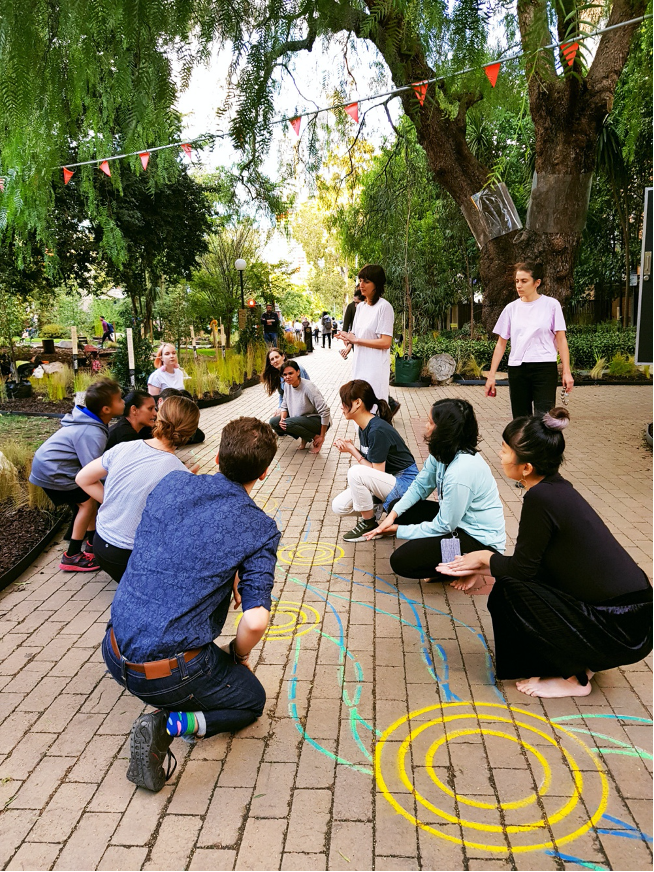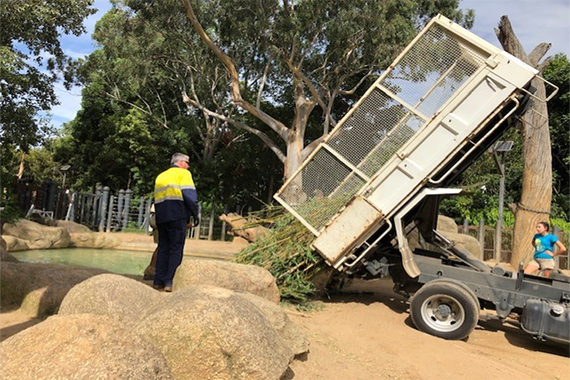Sustainability and Recognition Update
Learn about the innovative sustainability practices currently being implemented on site, as well as recognition received for recently completed projects.
- The City of Edmonton in Canada has adopted Estate Planning and Development’s Hoarding Design Standards, which were developed by the New Student Precinct as part of a 14-kilometre Light Rail Transit corridor development scheduled to begin in 2021. Developed in conjunction with Arup, these standards outline best practice in relation to design, positioning, and content of hoarding on construction sites. The City of Edmonton has identified the standards as industry best practice and will use them to guide decisions on-site hoarding installation.
- The Living Pavilion, an Indigenous-led temporary space designed for CLIMARTE’s ART+CLIMATE=CHANGE festival, has received an Award of Excellence in the Community Contribution category at the 2020 Vic Landscape Architecture Awards. The New Student Precinct team worked alongside groups from across the University to create a place which celebrated past, current and future ecologies.

Above Image: A participatory Living Pavilion initiative focusing on indigenous sense of place. Photo: Tanja Beer
- The Living Pavilion also received a National Landscape Architecture Award of Excellence for Community Contribution from the Australian Institute of Landscape Architects' (AILA). Receiving the highest award in this category, The Living Pavilion was chosen due to its 'outstanding contribution to the advancement of community contribution in landscape architecture'. The Pavilion was commended especially for successfully revealing and celebrating past, present and future landscapes, ecologies and cultures.

- The New Student Precinct project supported the Sustainable Development Goals, Climate Change and Cities Symposium (30 September - 2 October 2020) presented by the Melbourne School of Design. The virtual symposium format provided a platform for delegates to listen and interact with some of the world’s leading voices in urban sustainability and action on climate change over three days. New Student Precinct student ambassadors were instrumental in facilitating and convening the event, while the Precinct’s Communications and Engagement Manager, Leah Hyland, and student intern, Dante Di Paolo, sat on a discussion panel examining how organisations can mobilise and engage youth amidst global stress and uncertainty. One of the Precinct architects and leading sustainability advocate, Jeremy McLeod from Breathe Architecture, hosted the session that also included presentations from Master of Environment student Amelia Leavesley and Sabareesh Suresh from the City of Dehradun’s Child Friendly City project.

- Precinct Main Works contractors, Kane Constructions, have begun implementing a series of innovative sustainability initiatives which will minimise waste and maximise the repurposing of existing materials on-site. These initiatives are in addition to the Precinct's 5 and 6 Green Star building ratings.
Initiatives include:
- A dedicated soft plastics bin is on site so that these materials can be sent to GT Recycling, a specialised plastics recycling firm. Here, they are turned into building materials which will form the basis of outdoor furniture in the Precinct.

- Building materials salvaged from on-site demolition have been repurposed for various sustainability initiatives on campus:

- Bricks from the Alice Hoy Building have been collected and crushed and will be manufactured into pavers, which will be installed in the terraces of the Student Pavilion in 2021.
- Concrete from the Alice Hoy Building has been crushed and given to VicRoads, who will use it in the development of new roads around the state.
- Used coffee grounds are being combined with natural ingredients to create a chemical-free body scrub which is then given to Kane staff and clients.
- 88 Zenith ‘Jac’ chairs have been purchased for use in the 1888 Building. For each chair purchased, Zenith plants a tree in a reforestation programme running in Tasmania’s Midlands. These chairs will continue to be specified in other areas of the Precinct.
- To reinforce the importance of a circular economy in this process, Kane has specified a melamine recycled furniture range for some of the Precinct’s study spaces.
- Two truckloads of bamboo cleared from the Precinct site were donated to the Melbourne Zoo as food for the elephants. More information on this initiative can be found here.

